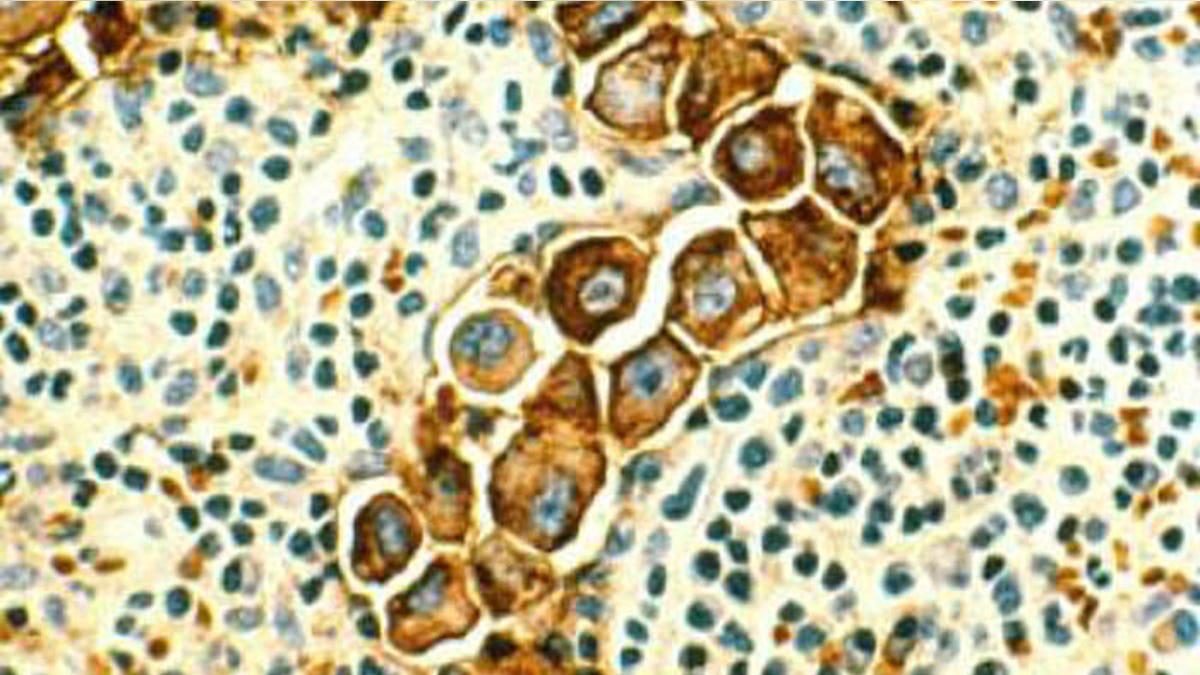
This image shows metastasized human breast cancer cells (magnified 400 times, stained brown) in lymph nodes. (National Cancer Institute)
Having breast cancer during pregnancy is one of the most challenging problems a patient and her obstetrician can face. The instance of breast cancer in pregnant women is about 1 in 3,000 -- making it one of the most common types of cancer found in pregnancy. You may hear this referred to as gestational breast cancer or pregnancy-associated breast cancer (PABC).
The good news is when you compare pregnant and non-pregnant women who have been diagnosed with breast cancer, survival rates are similar. In fact, studies show there is no difference in 10-year survival rates between the two groups of women.
The most difficult obstacle is developing a treatment plan, since the patient and the doctor have to make hard decisions to ensure all options are available. This is why it is important for a patient to have all her key experts working together to come up with solutions. A patient's team should include her obstetrician, an oncologist, a radiation oncologist and even a psychologist, to consider the well-being of both the mother and the baby.
One major challenge in gestational breast cancer is hormonal changes. These hormones can alter breast tissue causing it to be bigger in size, more tender and make it harder to notice a lump until it is potentially quite large, or at an advanced stage. When a lump is noticed, it is crucial that it is investigated immediately. There are ways to diagnose lumps in the breast during pregnancy, including ultrasounds and magnetic resonance imaging (MRI). In addition, a biopsy during pregnancy is perfectly safe and does not put the baby or the mother at risk. If a surgical biopsy is required, general anesthesia is also usually safe while pregnant.
Breast cancer treatment during pregnancy is dependent on the gestational stage of the pregnancy and the size and aggressiveness of the cancer. Common treatment options often include surgery and chemotherapy. Chemotherapy is generally safe if it is given later in the pregnancy, especially late in the second trimester or third trimester. However, adjunct treatments like radiation and hormone therapy are normally delayed until after the baby is delivered.
From an obstetrician's point of view, what doctors tend to do -- depending on when the breast cancer is found -- is bring the pregnancy into a stage where there are strong and viable options. One option may include an elective delivery as soon as the doctor feels the baby is large and mature enough to survive in the neonatal nursery.
As I have said before, because many women are delaying childbirth until much later on in life, breast cancer screening is very important before you become pregnant. Talk to your doctor about having a breast exam and mammogram before you start trying to conceive, because unfortunately, these problems can develop during pregnancy and pose a real danger for you or your baby.
The post Breast cancer in pregnancy: What you need to know appeared first on Ask Dr Manny.
